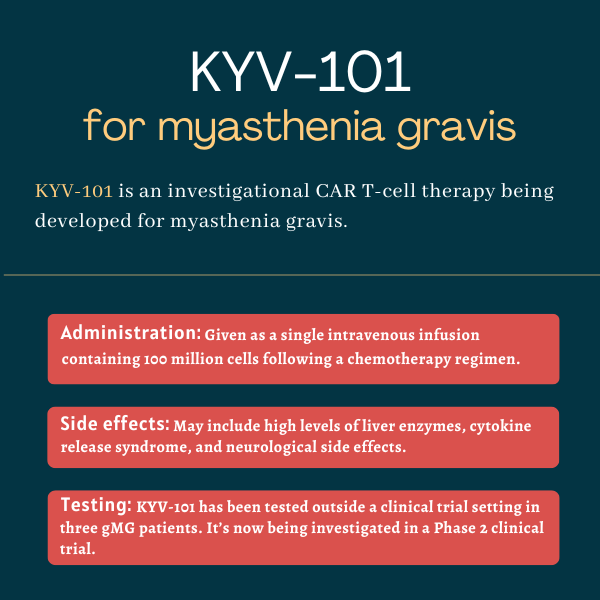KYV-101 for myasthenia gravis
Last updated Nov. 25, 2024, by Joana Carvalho, PhD

What is KYV-101 for myasthenia gravis?
KYV-101 is an investigational CAR T-cell therapy designed to reduce the levels of antibody-producing immune B-cells and potentially ease disease severity in people with myasthenia gravis (MG). It is being developed by Kyverna Therapeutics to be given as a single intravenous, or into-the-vein, infusion following a short course of chemotherapy.
The therapy has received regenerative medicine advanced therapy, fast track, and orphan drug designations from the U.S. Food and Drug Administration for MG. It has also been granted orphan drug status for the treatment of MG in Europe. All these designations are intended to support and expedite the therapy’s development and regulatory review.
KYV-101, which is currently in Phase 2 clinical testing for MG, is also being investigated as a potential treatment for other autoimmune conditions, including lupus nephritis, systemic sclerosis, multiple sclerosis, and stiff person syndrome.
Therapy snapshot
| Treatment name: | KYV-101 |
| Administration: | Being tested in myasthenia gravis as a single intravenous infusion |
| Clinical testing: | In Phase 2 clinical testing |
How does KYV-101 work in myasthenia gravis?
MG is an autoimmune disease caused by self-reactive antibodies mistakenly attacking proteins involved in nerve-muscle communication, leading to symptoms of muscle weakness and fatigue.
KYV-101 is an investigational chimeric antigen receptor (CAR) T-cell therapy designed to target and eliminate B-cells, the immune cells responsible for producing those autoantibodies, which is expected to ease MG severity. It is an autologous therapy, meaning it uses a type of immune cell called T-cells (which are capable of killing other cells) from the patient’s own blood to create the final product.
After being collected, these T-cells are engineered to carry a special receptor, called a chimeric antigen receptor, that will help them specifically recognize and attack B-cells when infused back into the body. This occurs because the CAR receptor in KYV-101 is designed to bind to CD19, a protein that’s found on the surface of B-cells.
While approved CD19 CAR T-cell therapies contain antibodies derived from mice, the man-made receptor in KYV-101 recognizes its target through a fully human antibody fragment. It also contains a CD28 costimulatory domain and a CD3 zeta signaling domain. This specific domain combination has been shown to reduce the release of cytokines — signaling molecules that mediate immune and inflammatory responses — which may help improve the therapy’s safety profile, according to Kyverna.
How will KYV-101 be administered in myasthenia gravis?
KYV-101 is designed to be administered via a single intravenous infusion following a short course of chemotherapy that’s given to wipe out a patient’s immune system before the modified cells are reinfused.
In a Phase 2 clinical trial involving people with generalized MG (gMG), the injection contained 100 million CAR T-cells and the lymphodepletion regimen was given in a two-day course. However, it’s still unclear if this will be the selected dose and pretreatment regimen used if, and when, the therapy is ultimately approved.
KYV-101 in myasthenia gravis clinical trials
KYV-101 was first tested in a female patient with severe, treatment-resistant gMG, who was positive for self-reactive antibodies targeting the acetylcholine receptor (AChR), the most common type of MG-causing antibodies.
Within eight days of receiving a single infusion of KYV-101, the woman’s B-cells were nearly completely eliminated. By day 62, her levels of anti-AChR antibodies had dropped by around 70%. At the same time, she showed improvements in muscle strength and endurance, which was demonstrated by an increase in the distance she was able to walk without a supportive device and in the time she was able to hold out her arm horizontally. Improvements (reductions) in fatigue and in validated measures of MG severity were also seen in the first two months following treatment.
The therapy was found to be safe, with the patient experiencing no side effects related to CAR T-cell therapy, such as neurotoxicity or cytokine release syndrome (a potentially life-threatening exaggerated immune response).
KYV-101 was also tested in two female patients with both MG and Lambert-Eaton myasthenic syndrome (LEMS), another rare autoimmune disorder that causes muscle weakness and fatigue. Both were positive for anti-AChR antibodies, as well as self-reactive antibodies targeting a protein called voltage-gated calcium channel, which are typically seen in people with LEMS.
Consistent with the previously reported case, the two patients experienced rapid reductions in B-cells and in the two types of self-reactive antibodies after treatment with 100 million KYV-101 CAR T-cells. While both patients depended on a wheelchair to move about before receiving KYV-101, they regained full mobility and were able to return to their everyday life activities within two months. Improvements in validated measures of MG severity and quality of life were also observed in the two patients.
Minor or moderate cytokine release syndrome was observed in both women shortly after treatment, and one also experienced neurological side effects. However, all side effects were successfully managed with immunosuppressants and corticosteroids, with symptoms resolving within approximately 10 days.
An update from Kyverna showed all three patients continued to show reductions in autoantibody levels and sustained disease control for more than eight months. In two of them, these benefits were maintained for more than a year following treatment with KYV-101.
Ongoing trials
Based on the promising early findings, Kyverna launched an open-label Phase 2 clinical trial called KYSA-6 (NCT06193889) in the U.S. and Germany to evaluate the safety, tolerability, and efficacy of KYV-101 in 20 adults with gMG. Eligible participants are those with refractory, or treatment-resistant, disease, who are positive for self-reactive antibodies targeting AChR or muscle-specific kinase.
After undergoing apheresis, a procedure used to collect T-cells from the bloodstream, patients will undergo a two-day course of lymphodepletion with two different chemotherapy agents (cyclophosphamide and fludarabine). Three days after the lymphodepletion regimen, they will receive a single intravenous infusion of KYV-101 containing 100 million CAR T-cells. They will then be followed for up to two years.
The trial’s main goals include assessing the incidence and severity of side effects and laboratory abnormalities for up to two years, as well as changes in scores on the MG Activities of Daily Living test, a patient-reported measure of disease severity, over the course of 24 weeks (about six months). Changes in other measures of MG severity, quality of life, fatigue, and self-reactive antibody levels will be evaluated as secondary goals.
KYSA-6 is expected to conclude in 2027.

Common side effects of KYV-101
While the first clinical trial of KYV-101 in people with MG is still ongoing with no results reported to date, the therapy has been tested in three gMG patients outside a clinical trial setting. Side effects experienced by these patients included:
- transminitis, or an elevation in the levels of liver enzymes indicating liver damage
- cytokine release syndrome
- neurological side effects such as fatigue, difficulty speaking, and impaired handwriting.
More data will be needed to determine if these are side effects commonly experienced with KYV-101 and to better understand its safety profile in this patient population.
Myasthenia Gravis News is strictly a news and information website about the disease. It does not provide medical advice, diagnosis, or treatment. This content is not intended to be a substitute for professional medical advice, diagnosis, or treatment. Always seek the advice of your physician or other qualified health provider with any questions you may have regarding a medical condition. Never disregard professional medical advice or delay in seeking it because of something you have read on this website.
Recent Posts
- Switch to Zilbrysq for gMG found safe, effective in clinical trial
- As I get back to swimming, slow and steady wins the race
- Working through myasthenia gravis, one story at a time
- Azathioprine eases MG symptoms, but does not extend survival: Study
- How studying history can help us navigate life with chronic illness
Related articles






